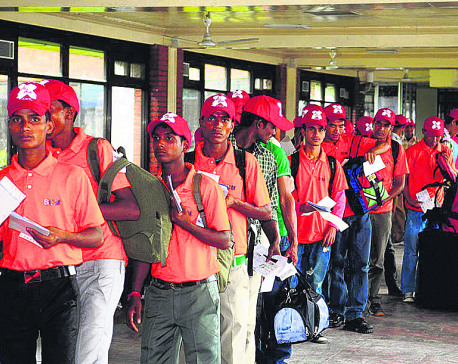
OR
CTEVT is helping people acquire skills needed for the market
Published On: November 5, 2020 01:55 PM NPT By: Republica | @RepublicaNepal

KATHMANDU, Nov 5: The CTEVT is the apex body overseeing technical and vocational education and training in the country. It has been organising various skill-oriented training. The agency launched a TVET social media campaign in light of the pandemic. Here is a conversation with Anil Muni Bajracharya, information officer at Research and Information Division, the Council for Technical Education and Vocational Training (CTEVT).
What is the reason behind the campaign, and who are the target groups?
We focus on good governance, permeability, quality relevance, education and employment linkages, and the CTEVT has been working effectively to promote these sectors. Our goal is to produce a skilled workforce as per the market demand. The TVET public information campaign was launched in February 2020 to aware the benefits of TVET, and the employment opportunities that TVET can offer to students, teachers. The pandemic has a severe impact on the campaign activities. The campaign then shifted to focus on digital means, targeting the same audiences. We not only reached a huge number of students but also were able to engage with them on a daily basis.
Some see TVET as a second tier education. The campaign has been promoting 'With Skills in Hand, Employability is a Chance' as a tagline and trying to reach and inform young people about job opportunities.
I feel proud to say that we achieved a milestone of reaching CTEVT Facebook page followers of more than 80,000 people. We are receiving positive responses and massive engagements on regular posts, quizzes, and contests. We are delighted to connect with youths very effectively and our target groups.
What sectors does the campaign promote?
We want to educate SEE students about TVET as a viable career and foster the linkage between the TVET graduates and the prospective employers. We are profiling successful TVET graduates as changemakers, employers, parents, TVET students, school principals, TVET faculties. We provide information on industry demands, required skills set,through photo stories, success stories of changemakers and employer insights. For instance, employers represent their projections on actual needs of the designated employees on the agriculture, health sector, hospitality and tourism sector, manufacturing industry, and the graduates search for available jobs. Similarly, TVET graduates who are self-employed and creating employment opportunities share their success stories on how they acquired and utilised their skills.
We also have a platform for parents to share their information on why they choose TVET for their children as a career path and what changes they go through after such vocational training. This social media campaign has helped us connect with the target groups. This has eventually helped people to communicate with us and answer their questions.
How does the campaign connect with the returning migrants?
The CTEVT focuses on three types of employment: wage-based employment, foreign employment, and entrepreneurship. We do not promote foreign employment. But if someone wants to go abroad in search of jobs, they must learn and get skills which will make a dramatic difference in their compatibility and earnings. We teach them to tackle 3Ds: danger, difficulty, and dirty employment, and assure that by learning the skills one can tackle those obstacles. There is a high scope of employment opportunities in the agriculture sector. Many returning migrants have started working in the barren lands using modern skills and technology. We publish the stories on social media to influence and encourage them to innovate their business activities. We highlight the real stories and inform them about our contextual and practical education system. For example, before the pandemic, there used to be transactions of four crores of coriander import per month. If one can start such business here, it provides good earning for starters.
Will this campaign help bridge the gap between the employers' projections and skilled workforce?
With many ongoing hydropower projects in different districts of Nepal, a large number of welders are in demand. And each welder can earn 40,000 to 50,000 rupees per month. We feel this campaign will help change attitudes toward such jobs.
In every TVET institution, there is a job placement and counseling unit, which runs activities to link the graduates to the related industry. Butwal Industrial Estate has more than 80% Indian employees, but due to outburst of the pandemic, they went home. This campaign's popularity and interactions have proven that there are opportunities for qualified human resources. We post on our social media about the importance of skills needed for the job market.
How successful has the campaign been in helping people get jobs, and start their own businesses?
We ran a pilot project in Tikapur, Pokhara, and Janakpur. We set up promotional social media campaigns to interact with local entrepreneurs, employers, and industry champions. Along with CTEVT facebook page, we are running a campaign across three TVET institutions facebook pages simultaneously. This has helped us feature voices of local changemakers so that the people can relate their struggles and success stories. For instance, many people are actively involved in banana farming in Tikapur, Kailali, and are providing employment opportunities to hundreds of people. When local employers and focal persons come to the mainstream and share their success stories, other people get the confidence to start something on your own. I am hopeful that we can see meaningful results in the years to come.
You May Like This

Foreign Employment Board misses training targets
KATHMANDU, Dec 30: The Foreign Employment Board has fallen short of its target to provide free vocational training to 15,000... Read More...

Govt laying emphasis on technical education, Minister Pokharel
KATHMANDU, Sept. 6 (RSS): Minister for Education Girirajmani Pokharel has said that the government has prioritized technical education in the... Read More...

CTEVT vehicle recovered from Sunkoshi River with two bodies after five days
SINDHULI, June 6: The vehicle carrying CTEVT employees that had plunged into the Sunkoshi River has been located and recovered... Read More...




Just In
- Govt receives 1,658 proposals for startup loans; Minimum of 50 points required for eligibility
- Unified Socialist leader Sodari appointed Sudurpaschim CM
- One Nepali dies in UAE flood
- Madhesh Province CM Yadav expands cabinet
- 12-hour OPD service at Damauli Hospital from Thursday
- Lawmaker Dr Sharma provides Rs 2 million to children's hospital
- BFIs' lending to private sector increases by only 4.3 percent to Rs 5.087 trillion in first eight months of current FY
- NEPSE nosedives 19.56 points; daily turnover falls to Rs 2.09 billion















Leave A Comment